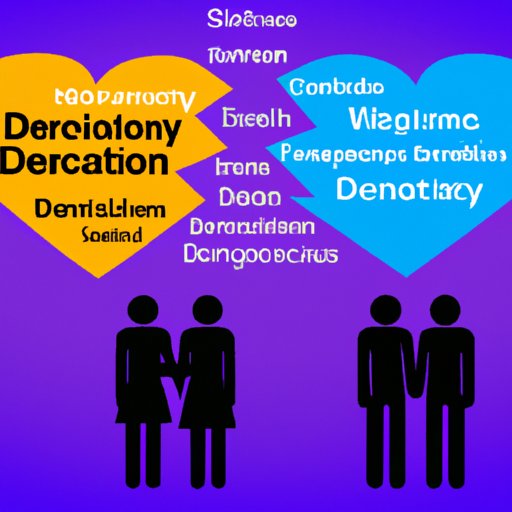Introduction
Divorce is a difficult and emotionally taxing process that can have long-term impacts on all involved. It is important to understand the legal process for filing for divorce, as well as the financial and emotional implications that come with it. This article aims to provide a comprehensive guide for those considering filing for divorce, outlining the legal process and providing tips and advice to help them through this difficult time.
Outlining the Legal Process for Filing for Divorce
The first step in filing for divorce is to familiarize yourself with the laws in your state. Each state has its own set of laws governing divorce, so it is important to understand the specifics of your case before proceeding. In some states, you may be required to live separately for a specific period of time before filing for divorce. You will also need to determine if your state allows for no-fault divorce, which is when neither party is held responsible for the dissolution of the marriage.
Once you have determined the requirements for filing for divorce in your state, the next step is to file the paperwork with the court. This paperwork should include a petition for divorce, as well as other documents such as an affidavit of residence and a financial affidavit. The paperwork must then be served to your spouse, who will need to respond within a certain period of time. Once the response has been filed, the court will issue a hearing date and both parties will need to attend. At the hearing, the judge will make a ruling based on the evidence presented.

Explaining How to Choose a Divorce Lawyer
Choosing the right divorce lawyer is essential for ensuring that your rights are protected throughout the process. An experienced and qualified lawyer can provide invaluable assistance in navigating the legal process, as well as helping to ensure that the outcome of the hearing is favorable. When selecting a lawyer, it is important to research their qualifications and experience in handling divorce cases. Ask potential lawyers questions about their experience and any specializations they may have. Be sure to evaluate all of your options before making a decision.
Discussing the Benefits of Mediation in Divorce Proceedings
Mediation is an alternative to traditional litigation that can often be beneficial for divorcing couples. It involves both parties meeting with a neutral third-party mediator to discuss and negotiate the terms of the divorce settlement. Mediation can be less expensive than going to court, and it can also be faster, as the parties can reach an agreement without having to wait for a trial date. Additionally, mediation can be less stressful and more amicable than a court battle, as it allows both parties to have a say in the outcome.
When engaging in mediation, it is important to keep an open mind and be willing to compromise. Both parties should strive to remain respectful and focused on reaching an agreement that is fair and equitable. Additionally, both parties should consult with their respective attorneys prior to entering into any binding agreements.

Describing the Financial Implications of Divorce
Divorce can have significant financial implications, especially when it comes to dividing assets and determining alimony payments. In most cases, assets are divided equitably between the two parties, meaning each person receives a fair share of the marital property. Alimony payments, or spousal support, can also be ordered by the court and are typically paid by the higher-earning spouse to the lower-earning one. It is important to understand the tax implications of any asset division or alimony payments, as these can affect your overall financial situation.
Identifying Local Resources Available for Divorcing Couples
Local resources can be invaluable for those going through a divorce. Support groups can provide a safe space for individuals to discuss their feelings and receive emotional support from others who have gone through similar experiences. Additionally, there may be legal aid services in your area that can provide low-cost or free legal advice. Community organizations may also have resources available to those who are going through a divorce.

Examining the Impact of Divorce on Children
Divorce can have a profound impact on children, both mentally and emotionally. It is important to recognize the potential psychological effects of divorce, including depression, anxiety, and difficulty forming relationships. It is also important to be aware of the emotional impact of divorce, as children may struggle with feelings of guilt, abandonment, and grief. Parents should work together to help their children adjust to the changes and address any common challenges that may arise.

Addressing the Emotional Challenges of Divorce
Divorce can be an emotionally challenging process, and it is important to take care of yourself during this time. It is normal to feel overwhelmed and anxious, but it is important to find healthy ways to cope with stress. Grief is also a common emotion that accompanies divorce, and it is important to allow yourself to process your emotions. Finally, it is important to focus on building a new life, whether through finding new hobbies or reconnecting with old friends.
Conclusion
Going through a divorce can be a difficult and emotionally draining process. This article provided a comprehensive guide for those considering filing for divorce, outlining the legal process and providing tips and advice to help them through this difficult time. Topics discussed included the legal process for filing for divorce, how to choose a lawyer, the benefits of mediation, the financial implications, local resources available, the impact of divorce on children, and the emotional challenges. Ultimately, it is important to remember that you are not alone and there are resources available to help you through this process.
(Note: Is this article not meeting your expectations? Do you have knowledge or insights to share? Unlock new opportunities and expand your reach by joining our authors team. Click Registration to join us and share your expertise with our readers.)
